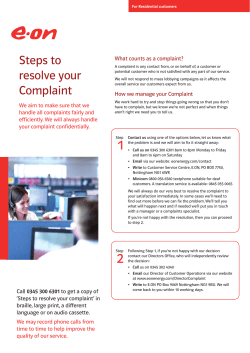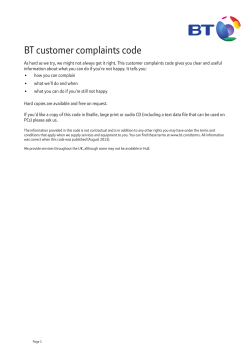
How to Complain A guide for parents/carers
How to Complain A guide for parents/carers Steps to take when a parent or carer has a complaint about a school or the Local Authority (LA) Mostly parents have positive relations with schools, but on occasions things may go wrong. All complaints should be taken seriously and schools are expected to have procedures in place for dealing with them. Parents can ask the school for a copy of their complaints procedure so that they know exactly how things will be handled. School governors have a responsibility under the School Standards and Framework Act 1998 to deal with all complaints about the school. Where do I begin? The place to start is the school. It is much better if things can be sorted out within school even if this might feel a bit awkward in the beginning. There is usually more than one side to any disagreement or misunderstanding and it is important that all the facts are known so that the best solution can be found. In the first instance you should contact the school, speak to the school secretary and ask who is the best person to deal with your complaint. Then make an appointment to meet with that person and / or write a letter. In a primary or special school this may be the child’s class teacher, the Special Educational Needs Coordinator (SENCO) or the Head Teacher. In a secondary school parents may be advised to contact the Form Tutor, Year Head or the Head of Lower / Upper School. What do I do then? Think carefully about the nature of your complaint. If there has been a specific incident, you need to gather the facts and try to separate what may have happened from what actually happened. You should make written notes of the details. In particular you need to be clear about: 1) 2) 3) 4) 5) 6) What you are complaining about When and where the incident happened Who else was involved Whether anyone saw it happen Who you have spoken to already spoken to about the incident What you want to happen as a result of your complaint. Or, you may wish to raise concerns relating to a more general area of dissatisfaction, for example your child’s special educational needs not being met. The Special Educational Needs March 2014 Code of Practice (see end for details) sets out guidance for schools on identifying, assessing and making provision for children’s special educational needs. The school will look into the issues raised and respond once the relevant facts have been established. If you have concerns about a child with Special Educational Needs and you are not happy with the response you have received from the school, you can contact the nominated Special Educational Needs Governor who should be able to help resolve the dispute. What if the complaint is about the Head Teacher? If the complaint is about the Head Teacher then you should contact the Chair of Governors of the school. The school will give you the name of the Chair of Governors and how they may be contacted. The Chair or a nominated Complaints Governor will investigate your concerns and respond directly to you. What if the complaint is about the Governing Body or an individual governor? If the complaint is about the conduct of a governor, this should be referred to the Chair of Governors in the first instance. The Chair will investigate your concerns. If the complaint relates to the Chair of Governors, then the nominated Complaints Governor will investigate this and school will give you their contact details. Complaints about the Governing Body as a whole should be directed to the Chair of Governors and the Secretary of State for Education and Skills. What can I expect to happen? You should be listened to so that your complaint is understood. Complaints need to be investigated and the Head Teacher or Chair of Governors will need some time in which to do this. A reasonable amount of time for most complaints is 20 school days (however this may vary from school to school depending on an individual school’s complaint policy). You should be told if it will take longer than this. If the school agrees that the complaint is justified, you should be told about the action that will be taken. In some cases it is possible that disciplinary action may be taken against a member of staff. This is a decision for the Governing Body, not the LA. There is a separate procedure for schools to follow in dealing with staff disciplinary matters. If disciplinary action is taken you will not be told the details of this due to employment rules on confidentiality. If the school does not support the complaint, you should be told the reasons for this decision and may ask for these in writing. March 2014 What if I am not satisfied with the way in which the school has dealt with my complaint? You should be told of your right to appeal. If the Head Teacher and the nominated Complaints Governor have been unable to resolve the complaint to your satisfaction, a Committee of the Governing Body who has had no involvement with the complaint so far should deal with the appeal. If you are still dissatisfied, you can contact the Secretary of State for Education and Skills. How can the LA help? If you are dissatisfied with the school’s response, the LA will investigate how the school handled the complaint and will let you know its opinion on how the investigation and appeal were conducted by the Governing Body. For the majority of complaints the LA will not conduct an investigation into the actual complaint itself and will only become involved after the Governing Body has tried to resolve the complaint. The LA has a designated Complaints Officer who can be contacted in the first instance. If you remain dissatisfied after the LA has carried out its investigation you have a final right of appeal to the Secretary of State for Education and Skills who, if it is agreed that the complaint was justified, may direct the Governing Body to act in a particular way. If your complaint is about the provision of the National Curriculum, religious education and worship or Disability Discrimination, separate procedures apply if the school cannot resolve the complaint. What if the complaint is about the LA? The City Council has its own Complaints Procedure and you can ask for a copy of this that includes a complaints form. If you are not satisfied with the Council’s answer, or if the Council does not answer within a reasonable amount of time, then in certain circumstances you can complain to the Local Government Ombudsman. A booklet about this is also available that includes a complaints form. You can contact the Local Government Ombudsman on 0845 602 1983 or website address www.lgo.org.uk Who can help? If you feel worried about making a complaint about your child’s school you could involve a friend, representative to help you. There are other agencies that might be able to support parents, for example, Advisory Centre for Education (ACE) on Freephone 0808 800 5793 or Independent Panel for Special Education Advice (IPSEA) 0800 0184016. If the complaint is connected with your child’s Special Educational Needs you could ask for support from the Parent Partnership Service. Also, Local authorities now have a duty to provide an independent disagreement resolution service for parents/carers, schools and LA’s where there is a disagreement about provision for a child’s Special Educational Needs. The LA, school or parents/carers can all refer the disagreement to the Mediation Service (see end for details) March 2014 How long will the complaints process take? Complaints should be handled quickly and most issues should be resolved in a few days. Most investigations by the school should be completed within 20 school days, but if a complaint moves through all the above stages, it may take several months to resolve. Remember It is important that you raise your concerns as soon as they emerge. By taking positive steps early on, it is more likely that things will be resolved. It is important that you co-operate as much as you can with your child's school in any discussion about your child. You may find it helpful to write down your worries before a meeting and, if you want to, you can take a friend or relative with you. The Parent Partnership Services can help you to express your views and offer you support whenever you need it. How to Contact Us Carolyn Maw & Michelle Lowe (Support Workers) Derby Parent Partnership Service The Council House Corporation Street Derby DE1 2FS Telephone: 01332 641414 or e-mail: parent.partnership@derby.gov.uk Copies of Resolving Disagreements by Mediation booklet and referral form are available from: Together Trust Disagreement Resolution Service Schools Hill Cheadle Cheshire SK8 1JE Telephone: 0161 283 4836 email: drs@togethertrust.org Other information sheets produced by Parent Partnership Service: What Can I Do If I am Worried About My Child’s Progress? School Action/School Action Plus Individual Education Plans/Multi Element Plans Statutory Assessment Statement of Special Educational Needs Note in Lieu of a Statement Annual Reviews March 2014 If you, or someone you know, would like a copy of this information sheet in large print, on audio-tape or in languages other than English, please contact us. Notes March 2014
© Copyright 2025











